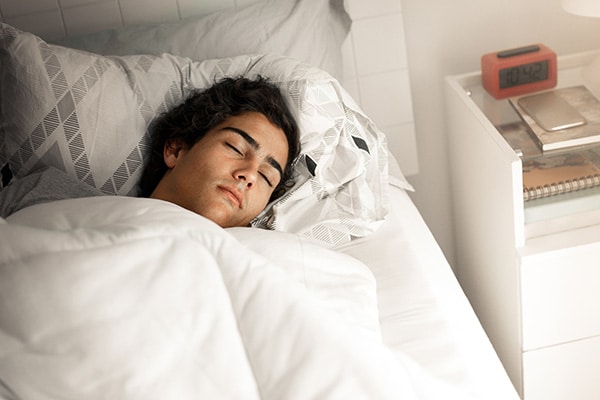Sleep Apnea Causes and Treatment
Sleep apnea is a serious health condition that causes breathing to stop or become very shallow during sleep, often without the person even realizing it. These pauses in breathing, known as apneas and hypopneas, can happen dozens or even hundreds of times a night, reducing oxygen levels and preventing deep, restful sleep.
At Greater Houston Orthodontics, we offer specialized orthodontic treatment to help patients manage and reduce the effects of sleep apnea. By improving jaw alignment and increasing airway space, our treatments can significantly enhance sleep quality and overall health.
What Is Sleep Apnea?
The term “apnea” comes from the Greek word meaning “without breath.” Sleep apnea occurs when airflow is blocked for 10 seconds or longer while sleeping. This typically happens when the tongue and throat muscles relax, the lower jaw shifts backward, and the airway becomes partially or completely blocked.
These episodes may be followed by gasping, choking, or snorting as the body jolts awake to resume breathing, often without the sleeper being aware. This cycle of interrupted breathing prevents the body from reaching the deep, restorative stages of sleep and triggers long-term stress on the cardiovascular system.
Signs and Symptoms of Sleep Apnea
Sleep apnea can affect both adults and children, and the symptoms may appear subtle at first. Common warning signs include:
Loud, disruptive snoring
Gasping, choking, or coughing during sleep
Waking with a racing heart
Daytime drowsiness or persistent fatigue
Morning headaches
Difficulty concentrating or memory problems
Mood changes such as irritability or short temper
Falling asleep unintentionally during the day
Weight gain or inability to lose weight
Acid reflux (especially in adults)
ADHD-like symptoms or bedwetting in children
Left untreated, sleep apnea has been linked to obesity, high blood pressure, cardiovascular disease, type 2 diabetes, and in severe cases, even stroke or death.
What Happens During an Apnea Event?
During sleep, the muscles that support the airway relax. For some people, this leads to a collapse of the soft tissues at the back of the throat, blocking airflow. Here’s what typically happens:
The airway becomes blocked as the jaw falls back and the muscles relax
Breathing stops for 10 seconds to over a minute
Oxygen levels drop, and carbon dioxide builds up
The brain triggers a stress response, causing:
Increased blood pressure
Rapid heartbeat
Jerking movements (arms, legs, or full body)
A brief awakening occurs (often with a gasp or snort)
The cycle repeats throughout the night
This constant interruption keeps the body in a stress state, leaving you exhausted, even after what appears to be a full night’s sleep.
How Orthodontics Can Help
Our doctors use advanced orthodontic techniques to treat the underlying structural issues that contribute to sleep apnea. Our non-invasive options, including oral appliances, are designed to:
Gently reposition the jaw
Keep the airway open during sleep
Improve airflow and oxygen intake
Reduce or eliminate snoring and apnea episodes
By working to improve jaw and airway structure, these treatments support more consistent breathing and better-quality sleep, without the need for invasive surgery or bulky CPAP machines.
Take the First Step Toward Better Sleep
If you suspect you or your child may be suffering from sleep apnea, don’t wait. Untreated sleep apnea can affect every area of life, from physical health to emotional well-being and daily functioning.
Contact us today to schedule a complimentary consultation and learn how our orthodontic treatment can help you sleep better, feel better, and live better.
